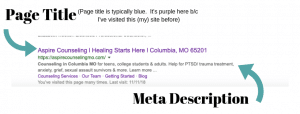Here is what you can look forward to with this blog:
Table of Contents:
What cornerstone content is not?
What is a Cornerstone Blog?
Why should I write cornerstone content?
What goes into writing cornerstone content?
What topics should I write about?
Will the client read a 2000 word blog post?
What If I Can’t Write 2000 Word Blog Posts?
Brief tips for long term maintenance
SOOO…You’ve probably had a planning call or are about to where your specialist has said, “Well since we are done with service pages, it’s time to move on to blogs”. Which may be exciting or evoke a feeling of dread. We know you’re busy people taking care of your business and your clients. The thought of writing three two thousand word cornerstone blogs can be stressful. Ok, pause, take a deep breath. I know this seems like a lot, and many of you may be wondering, how do I write it, what should I write it on, how can I write two thousand words, will clients read this, what is the point? And so on. All the questions surface. I am here to help you make sense of this and to guide you in what cornerstone content can look like. So, let’s dive in.
First things first, at Simplified we have specific plans for you. We know that writing blogs are very helpful in supporting SEO. We wouldn’t ask you to spend your time writing if it wasn’t going to help. This isn’t grad school, it’s your business. We value your time and efforts. So, know that we expect the freak out when we tell you to write this much, and we are happy to provide guidance.
What Cornerstone Content is Not?
First things first. You have written beautiful service pages that speak to your brand, business, and your services. These are meant to be around 500 words minimum. A cornerstone is not space for you to rewrite a longer version of your service page. Now you can do this, but a blog is more of a passion piece to write why you love therapy, how you’re specializing, common issues people encounter, helpful coping strategies, and so much more. It’s a taste of what people can get in therapy and a resource for potential and current clients.
What is a Cornerstone Blog?
A cornerstone blog is a glimpse into who you are in your practice. It will serve as a foundational piece of content, addressing key topics and establishing your authority in the field. You will write pieces that are meant to resonate with the core of your client’s struggles. It is not meant to be reiterating service pages. Neither are you trying to write a very technical piece about your services. No, you are speaking as who you are as a clinician, or about what your practice represents.
Remember those bits of wisdom that your clients give you. We can all learn from them. Perhaps, you can write an open letter to people dealing with anxiety. Empathize with their experience and give them hope. May even write a less technical explanation of how EMDR can help. There is a world of possibilities. Find your passion, a common thread, or write something new. Just listen and go deep.
Why Should I Write Cornerstone Content?
First, writing a cornerstone blog helps you build traffic and awareness of who you are as a clinician. You can only write so much on a service page, but you can expand when it comes to a blog. If there is a certain clientele you work with such as individuals dealing with trauma that shows up as anxiety, write a blog. There is no way you can truly encapsulate that you work with this population on a service page.
You become the expert
Another reason is that it establishes you as an expert. Google knows that you’re an authority when you write a service page with 500 words of content. However, when you write a blog post and link it to the page, Google begins to set you up as an expert because you have even more content.
Drives in traffic
It’s a great way to drive in traffic. What a well-written blog will do is help clients see a bit more into your therapeutic approach, your experience, and common issues people are dealing with that you can help with. By having 3 cornerstones front and center on the site, you’ll bring in more leads, which is the goal. Plus, by linking blogs to each other and service pages, you’re making your content more accessible. This reduces the bounce rate and ensures that potentials are getting all the information that they need upfront before deciding to continue further or bounce off. Service pages are great, but they only provide a small picture of what you can do.
Helps generate more blog ideas
Lastly, when struggling to write your posts, once you get started you may realize you have a lot more to say than you think. You could get to 2000 words and think I still have so much more to say, so this further allows you to generate ideas for shorter blogs, or it could be the beginning of a blog series.

What Goes into Writing Cornerstone Content?
First, you will want to identify keywords you want to boost. Now you can do this on your own by looking at your data dashboard with Simplified or from any free tool like Google Trends. Perhaps, you can even do a basic Google search on keywords you want to rank for and see where you land on the Google search engine. Then look at what people are searching for. Talk to friends, and family, listen to what new clients are saying, and create a list. Per blog, you’ll have the main keyword like EMDR therapy. Then you may have to tap EMDR, anxiety, EMDR, and dealing with trauma.
These can be subheadings, placed into alt text, or put throughout the copy. You or our specialists can either do this. The goal is to understand what your topic is and to make sure that the keywords make sense. Based on this choose the topic and begin writing. Break it down into subheadings, answer common questions, and so on. Here is an example of what cornerstone content can look like. After you’ve written the content it’s important to make sure it is well-optimized and kept up to date, which I will get into.
What Topics Should I Write About When Blogging for SEO?
Here is the thing, I can’t answer that definitively unless I’ve personally worked on your site. However, I can tell you some great examples. It’s always a good idea to write one on online therapy because you can boost harder-to-rank keywords such as therapy, therapist, online counseling, and so on. Plus, it helps with local SEO. You can write how-to guides, open letters, comprehensive guides to therapy, tips on how to cope with various issues, and a client-friendly understanding of therapy approaches. You can write about timely pieces, or even make it more personal if it’s in line with your code of ethics. There is a world of possibilities, so don’t box yourself in.
Honestly, Will Clients Read a 2000 Word Blog Post?
Yes and no. Honestly, most clients will not spend 10 minutes reading a 2000-word blog post, but that is where SEO comes in. Some of you may not like subheadings, but they are so useful. Clients will scan your page and look for a section that speaks to them before deciding what to do next or bouncing off. Subheadings help from an accessibility standpoint to organize your message and help clients find what they need faster. Now there may be special clients who will take the time to read your blogs, but most will scan.
If not, why write long cornerstone content?
That is where the SEO continues to be useful. Google reads everything because it tries to understand your writing and look for key phrases. When Google understands your message, it can help to align you with the correct traffic that may be looking for your page. So, Google will look for keywords, readability, internal and external links, alt text, and so on. That is what Google is for, to pair the reader with the right experience. So having these long in-depth blogs that have been well-optimized helps Google bring you the right traffic, more accurately, and more consistently. 
What If I Can’t Write 2000 Word Blog Posts?
The two thousand words are ideal and a suggestion. Ultimately, you have the autonomy to do what you choose, but it will help. We recommend it, but for those really struggling consider writing a shorter 2- or 3-part blog series on the same topic. To be honest, sometimes when you just give it a chance, you’ll find you have more to say than you think. Plus, once you’ve written them, that’s one big task out of the way. Take a breath and see what you’ve accomplished. Additionally, while it’s easier said than done if you have a group practice, have your clinicians write blogs, especially if they specialize in a particular service. Or look at old blog posts you can revamp.
How does blogging support SEO for my website?
Well-written content that has been well-optimized, helps Google draw in the right people. Cornerstones are often another first impression that helps the client understand who you are. Remember that part of the client experience is first impressions. According to a study done by the Missouri University of Science and Technology, when viewing a website, it takes users less than two-tenths of a second for someone to formulate a first impression. So, we must be mindful of how quickly some can be interested versus disinterested in how we can help. So, being clear in our message, taking time to show you understand what the client is dealing with and can help, having additional resources, and a clear way to get started matters. Check out our blog on how holistic SEO is a great way to engage clients.
Tips for Maintaining SEO With Cornerstone Content.
Lastly, I want to mention that it’s not enough to just write cornerstone content, you need to make sure it stays relevant. So, if you write content and something changes in the therapy world, make sure you’re going back to this content and updating it occasionally. We want to ensure not only Google but clients that we are staying on top of new advances and we intend to assist clients in the best way possible.
Ready to Begin Your SEO Journey to Writing Quality Cornerstone Content?
What other questions come up for you when you consider cornerstone content? Reach out to the Simplified Team if you have further questions on how we can help you. If you’re working on cornerstone content, you’re probably our ideal client, because we love optimizing these blog posts for SEO! Cornerstones are the next step in our process to make sure your SEO maintains, and you continue to draw in your people. How you put yourself out on the internet professionally impacts your direct traffic. Write meaningful and useful blogs that provoke action, and thought, and give resources to your current and potential clients. If you’re looking for someone to guide you in that process, get in touch with Simplified SEO Consulting. You will work with skilled mental health SEO specialists who are passionate about the field. To get started follow these simple steps:
- Schedule a consultation with our Client Success Specialist
- Learn about the Simplified Team!
- Start working with the clients that you serve best.
Other Services offered by Simplified SEO Consulting
Simplified SEO consulting offers a wide range of services that can help you begin working with your people. We offer Done for You SEO Service packages, online courses, and SEO training opportunities. Our most popular course includes our “Top of Google” online course and we have 12 weeks of intensive SEO for those who want to learn with a guide. For those looking for a more specialized package, we also offer an SEO strategy package. To get started, schedule a consultation with our Client Success Specialist today!
About the Author: 
Jasmine Jaquess is currently working towards her Master of Arts in Clinical Mental Health Counseling from Northwestern University. She has been doing SEO with Simplified for the last few months. Currently, she serves as the Client Success Specialist in new client consultation with Simplified SEO Consulting and is an SEO specialist. She specializes in platforms such as Squarespace and Wix but has learned to love WordPress sites as well. She really enjoys hearing the clients’ goals for their businesses and helping them achieve them.


 Simply put, getting to the top of Google helps you reach more clients and provide them with high-quality mental health services.
Simply put, getting to the top of Google helps you reach more clients and provide them with high-quality mental health services.  As SEO sp
As SEO sp A meta description is what shows up after the page title on a google search. A well-optimized meta description contains the keyword(s) you’re trying to rank for and a call to action that compels the user to click on your link. It’s basically your potential client’s sneak peek into who you are and the service you provide.
A meta description is what shows up after the page title on a google search. A well-optimized meta description contains the keyword(s) you’re trying to rank for and a call to action that compels the user to click on your link. It’s basically your potential client’s sneak peek into who you are and the service you provide.  Before I answer this question, I should probably warn you that my specialty is readability so I am very passionate about this topic.
Before I answer this question, I should probably warn you that my specialty is readability so I am very passionate about this topic.  First of all, you don’t HAVE to do anything. But, if you want to rank really well on Google, then I highly suggest you blog at least two times a month. Getting fresh content on your website shows Google that you’re still relevant. If you haven’t added content in quite a while, Google may question rather you’re still in business and operational. Without new content, they may give preference to other sites with fresh content.
First of all, you don’t HAVE to do anything. But, if you want to rank really well on Google, then I highly suggest you blog at least two times a month. Getting fresh content on your website shows Google that you’re still relevant. If you haven’t added content in quite a while, Google may question rather you’re still in business and operational. Without new content, they may give preference to other sites with fresh content.  You get a backlink when an external website links to your website. Typically this occurs when two websites share some common ground. A backlink is almost like citing your resources. It shows that the information you’re providing your client is coming from a reliable source. Backlinks also tell Google that you’re information is legitimate and trustworthy.
You get a backlink when an external website links to your website. Typically this occurs when two websites share some common ground. A backlink is almost like citing your resources. It shows that the information you’re providing your client is coming from a reliable source. Backlinks also tell Google that you’re information is legitimate and trustworthy. 
 If you’re ready to begin making SEO a priority, Simplified SEO Consulting would love to help. We offer a variety of options to support you at different points in your private practice journey. However, we always start with a free consultation to look at your website, ask what your needs are right now, answer your questions and see which of our services would be the best fit. To get started, follow these steps:
If you’re ready to begin making SEO a priority, Simplified SEO Consulting would love to help. We offer a variety of options to support you at different points in your private practice journey. However, we always start with a free consultation to look at your website, ask what your needs are right now, answer your questions and see which of our services would be the best fit. To get started, follow these steps: O): Organic search visibility is essential. SEO elevates your website’s ranking in search results, increasing the likelihood that potential clients will find you. It’s an investment that yields long-term benefits.
O): Organic search visibility is essential. SEO elevates your website’s ranking in search results, increasing the likelihood that potential clients will find you. It’s an investment that yields long-term benefits.

 As we know, stories, papers, and treatments come from a great foundation. There is an art to telling a great story and presenting information. Your approach doesn’t need to be the same as others, but there is a similar formula. If you want to convince someone that a treatment modality works, the base of your argument needs to be well-researched. Likewise, if I am trying to tell a creative story, I need to set the storyline up well. Ultimately, a successful delivery begins with a firm foundation. Otherwise, you have no hope of convincing your audience you’re knowledgeable or that you’re someone credible to listen to. And we know you’re intelligent mental health professionals!
As we know, stories, papers, and treatments come from a great foundation. There is an art to telling a great story and presenting information. Your approach doesn’t need to be the same as others, but there is a similar formula. If you want to convince someone that a treatment modality works, the base of your argument needs to be well-researched. Likewise, if I am trying to tell a creative story, I need to set the storyline up well. Ultimately, a successful delivery begins with a firm foundation. Otherwise, you have no hope of convincing your audience you’re knowledgeable or that you’re someone credible to listen to. And we know you’re intelligent mental health professionals!

 If you’re ready to begin optimizing your website to help you reach your ideal client on Google, then we’d love to help! Follow these steps to begin SEO services with
If you’re ready to begin optimizing your website to help you reach your ideal client on Google, then we’d love to help! Follow these steps to begin SEO services with 


 Discuss SEO strategy with you during our monthly planning calls
Discuss SEO strategy with you during our monthly planning calls


